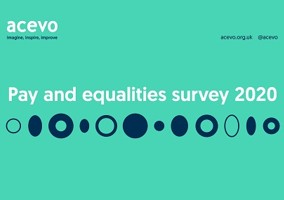Male charity chief executives earn on average 7.6% more than their female counterparts, down from 12.1%, according to an annual benchmarking survey.
ACEVO’s Pay and Equalities 2021 report was published this morning and found that the median pay was £58,000, up from £55,993 in 2020.
Chief executives at the largest charities earned more than those at smaller charities, with the median salary for leaders at organisations with an income of more than £15m being £103,000.
Leaders at large charities (incomes between £5m and £15m) earned on average £87,441. Those at medium-sized charities (£1m to £5m) earned on average £65,000 while those leading small charities (under £1m) earned on average £45,000.
Over 1,000 people responded to this year’s survey. Responses were gathered from 19 March to 6 May.
Pay gaps
The fall in the gender pay gap is down to more men leading smaller charities in this year’s sample.
People with an impairment or health condition are more likely to earn less than others.
Respondents who identified themselves as having an impairment, health condition or learning difference in the 2021 survey had a median salary of £55,000 compared with £58,700. This pay gap amounts to 6.3%, compared with 4.4% last year.
ACEVO says that 17% of respondents reported a form of impairment or health condition 17% and cautions that this figure is susceptible to outliers due to its size and should therefore be treated as indicative rather than representative of the sector at large.
Just 7% of respondents were from BAME backgrounds, which ACEVO says “means it is still not possible to understand much about median income by ethnicity” but that it will continue to gather and monitor the data.
Lack of ethinic diversity is not just an issue a CEO level.
Only a quarter of respondents said they were happy with the ethnic diversity of their boards, while 43% plan to address this area in the next year.
Less focus on governance
ACEVO says that this year’s survey highlights some “warning signs” that governance tools are being used less than in previous years.
For example, nearly half of respondents said they had no formal salary review on a regular basis, an increase of 10 percentage points from last year.
In addition, the number of CEOs holding up-to-date job descriptions has fallen to 69%, from three quarters last year. And just 17% have personal development plans.
Despite this more than eight in 10 CEOs would recommend a career in the sector.
Vicky Browning, CEO of ACEVO, said: “We were encouraged in 2020 to see an increase in the prevalence of regular salary reviews and up to date job descriptions; however, this year’s data shows a drop in these figures which is a cause for concern.
“While the challenges faced by the sector as it recovers from Covid-19 are significant, organisations will only be able to build back better if boards keep the focus on these key governance processes which allow leaders to make the biggest possible difference. Prioritising CEO wellbeing and professional/personal development is hugely important to ensure that the communities and causes charities work with and for continue to access the best possible service.”
Related articles











